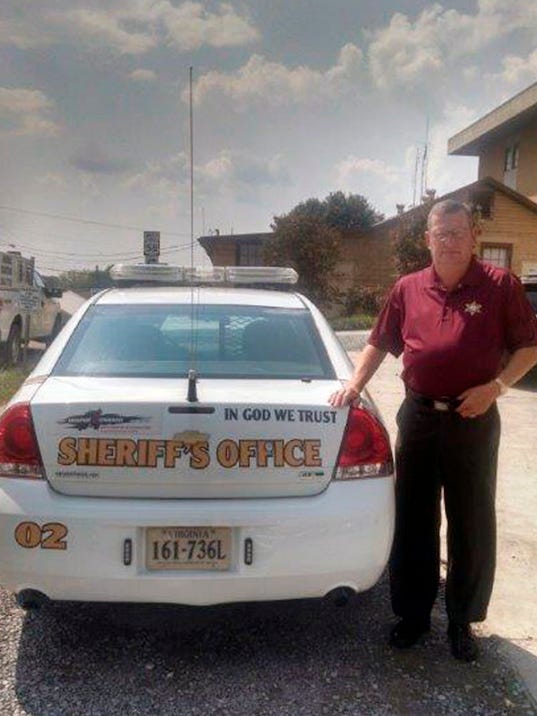 Police Agencies Defy Critics and Show ‘In God We Trust’
Police Agencies Defy Critics and Show ‘In God We Trust’
By ALAN BLINDER and RICHARD PÉREZ-PEÑAOCT. 3, 2015

Sheriff Johnny Moats’s department vehicle in Cedartown, Ga., the seat of Polk County. He bought the “In God We Trust” sticker with his own money after he heard that Missouri sheriffs had begun displaying them. Credit Kevin D. Liles for The New York Times
CEDARTOWN, Ga. — The chief deputy to Sheriff Johnny Moats of Polk County appeared in an office doorway one morning this month with a message he knew would delight his boss: Another Georgia lawman had heeded Sheriff Moats’s suggestion to add “In God We Trust” decals to official vehicles.
It was a small part of what has emerged as a big moment for the national motto, which has long been cherished by many Christians, criticized by those who say it infringes on the separation of church and state, overlooked by plenty and safeguarded by courts. In recent months, dozens of Southern and Midwestern law enforcement agencies have added the axiom to squad cars, usually to the vexation of vocal, often distant critics, and at the personal expense of sheriffs, police chiefs or rank-and-file employees.
“If it’s on my money and it’s on the state flag, I can put it on a patrol car,” said Sheriff Moats, who wrote to Georgia’s sheriffs this year to promote the motto’s placement on law enforcement vehicles. “Just about every single day, I have another sheriff calling and saying, ‘I’ve done it’ or ‘Can you send me a picture of your patrol car?’ ”

Sheriff Johnny Moats in the Polk County Public Safety Complex, where inmates painted a mural of the Ten Commandments. Credit Kevin D. Liles for The New York Times
Some officials contend that their display of the motto is elementary patriotism, a four-word way of “standing up for America, standing up for our country,” Sheriff Moats said. Others in law enforcement say the stickers are a response to the battering their profession’s reputation has taken after more than a year of high-profile killings and extraordinary scrutiny.
“With the dark cloud that law enforcement has been under recently, I think that we need to have a human persona on law enforcement,” said Sheriff Brian Duke of Henderson County, Tenn. “It gave us an opportunity to put something on our cars that said: ‘We are you. We’re not the big, bad police.’ ”
But critics worry that displays of “In God We Trust” on taxpayer-funded vehicles cross the threshold of constitutionality, even though the courts have repeatedly brushed aside challenges to the motto, which Congress enshrined in 1956. Explanations like the one Sheriff Duke offered have not curbed those frustrations.
“This motto has nothing to do with the problem of police forces’ shooting people, but it’s a great way to divert attention away from that and wrap yourself in a mantle of piety so that you’re above criticism,” said Annie Laurie Gaylor, a co-president of the Freedom From Religion Foundation, a Wisconsin-based group that has demanded that law enforcement officials stop exhibiting the motto. “The idea of aligning the police force with God is kind of scary. That’s the first thing you’d expect to see in a theocracy.”
A pattern has developed: A police or sheriff’s department begins using the stickers, and Ms. Gaylor’s group sends it a letter, arguing that the practice is unconstitutional and that the agency should desist. The dispute attracts attention, and more law enforcement agencies join the trend; indeed, some appear to relish the opportunity to tweak a critic.
In Texas, for instance, the police chief of Childress, Adrian Garcia, drew attention when he denied Ms. Gaylor’s request and, in a letter to her posted on the department’s Facebook page, asked “that you and the Freedom From Religion Foundation go fly a kite.”
Ms. Gaylor disputed suggestions that the foundation had unwittingly fostered the spread of the stickers. “I don’t think it has a thing to do with us,” she said.
Protests and warnings from critics like Ms. Gaylor also seem to be of little concern in places like Polk County, a few minutes from the Alabama border, where about 41,000 people live in a rural area dotted with churches, Confederate battle flags and fried chicken restaurants. The small atrium of Sheriff Moats’s building features a pair of murals painted by inmates, including one of the Ten Commandments on tablets that are more than six cinder blocks tall. A painted golden banner reading “In God We Trust” hangs above them.
The idea to add the national motto to patrol cars here, Sheriff Moats said, came after he saw on Facebook that Missouri sheriffs had begun doing so. Sheriff Moats spent $5 of his own money to buy a sticker for his department vehicle, which he said spurred deputies to ask how they might do the same. Within a week, most of the department’s cars had the stickers.
“I don’t know why an atheist is so upset about us putting up ‘In God We Trust,’ ” Sheriff Moats said. “I’m not saying that they trust God. I’m saying that we, as the guys in this department who put this on our cars, we trust in God. And why is that a bad thing? Even if you don’t believe, you know God’s all about good.”
He maintained that the motto’s presence did not signal that his department would discriminate. “You could be a satanic devil worshiper, and as long as you’re a law-abiding citizen and you need help, we’re going to help you,” he said.
There is nothing new about government display of the motto. The United States began stamping “In God We Trust” on some coins during the Civil War, and it has been on all coins since 1938. The words began to appear on paper currency in 1957.
There have been a number of unsuccessful legal challenges to the motto, but the Supreme Court has never addressed it directly. And critics, including Ms. Gaylor, concede that they are unlikely to win a favorable ruling soon.
“The motto is pretty much immunized from constitutional challenge unless you can show really bad intent,” said Steven K. Green, a law professor at Willamette University and former legal director of Americans United for Separation of Church and State. “The likelihood of success is minimal. The likelihood of creating worse precedent is actually greater.”
So for now, Sheriff Moats said, there is little reason or incentive for him to abandon the stickers. When he stopped at Gran-Gran’s here one afternoon for a lunch of hamburger steak and banana pudding, customer after customer expressed support. One man asked whether Sheriff Moats happened to have with him any of the related “In God We Trust” stickers that have been sold at his office for $2 each. (He did, in his patrol car.)
The sheriff said that he had not yet received a letter from Ms. Gaylor, but that he had considered his response to a missive he knew would surely come.
“I’m just going to politely tell them that, as long as I’m sheriff of Polk County, it will not come off my car,” he said. “If the citizens of this county want it off my car, then they can vote for somebody else, and then maybe that person can take it off.”
___________________________________________________________________________________________________________________________
I “swiped” this from “The New York Times” to applaud these police. Besides those who object to the “flagrant violation” of the (wrongly interpreted) “separation of church and state”, some might object that this promotes a kind of “civil religion”—the old “God is America’s God” thing. But in these days when God is banned from the public square, I don’t think we have to worry about a civil religion!
True, every law enforcement officer who displays this bumper sticker may not be a Christian (God knows)—or maybe each one is—but even a general witness that gets his name before people is a good thing. Remember what Paul wrote: “Some indeed preach Christ from envy and rivalry . . . What then? Only that in every way, whether in pretense or in truth, Christ is proclaimed and in that I rejoice” (Philippians 1:15a,18). These officers aren’t preaching Christ. But they are “advertising” the Father.
So we can rejoice that God’s name is being “preached” on police car bumpers! And we can pray that God uses it to promote greater respect for law enforcement officers and from this that the One in whom we trust receives greater glory!
 News from Paris last night (http://www.nytimes.com/) seemed surreal. Were terrorist attacks really erupting throughout one of the world’s major cities? Were over 100 people really slaughtered as they went about a typical Friday night? It didn’t seem as frightening as “our” 9/11 (partly because it didn’t happen here); but it seemed more threatening. Maybe because after 14 years we assumed we had better control of our own safety. Maybe because it darkly warned, “This can happen anywhere, anytime.”
News from Paris last night (http://www.nytimes.com/) seemed surreal. Were terrorist attacks really erupting throughout one of the world’s major cities? Were over 100 people really slaughtered as they went about a typical Friday night? It didn’t seem as frightening as “our” 9/11 (partly because it didn’t happen here); but it seemed more threatening. Maybe because after 14 years we assumed we had better control of our own safety. Maybe because it darkly warned, “This can happen anywhere, anytime.”







